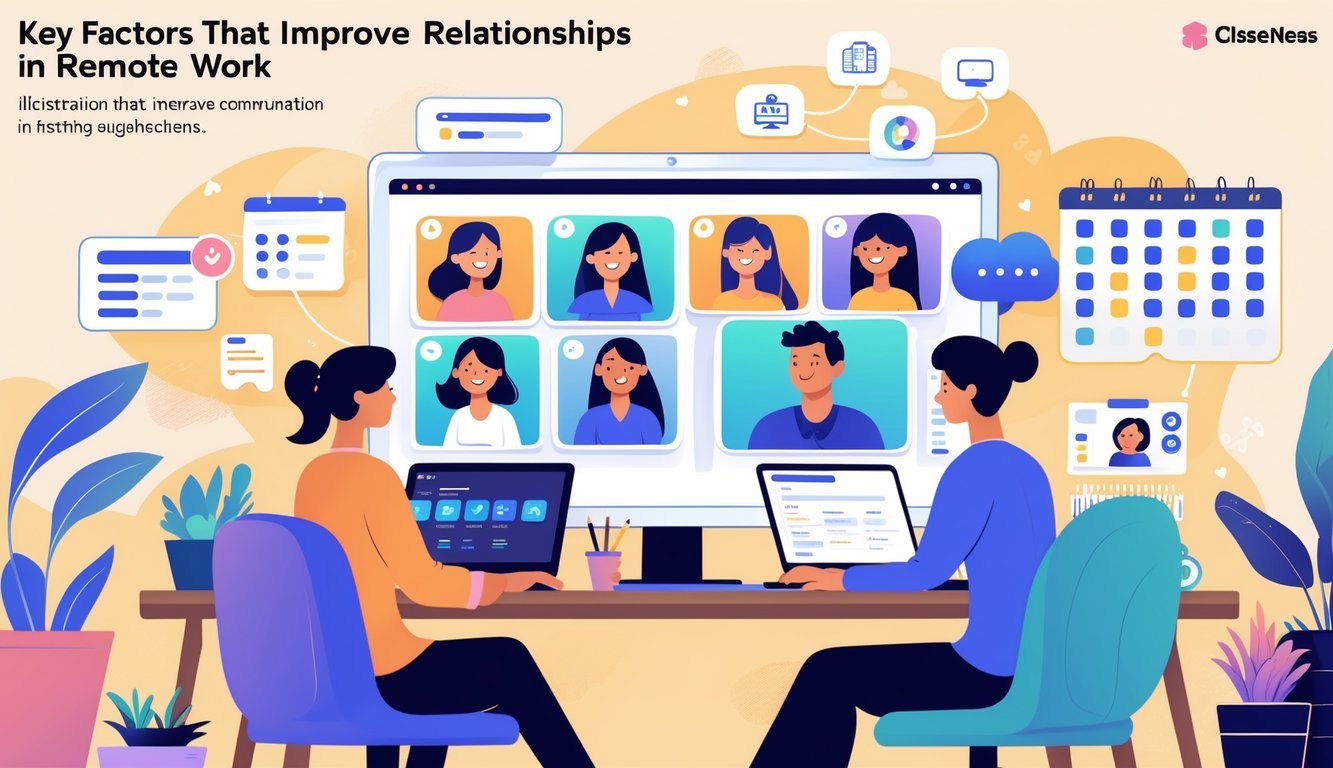PsychNewsDaily Publishers
100 Summit Drive
Burlington, MA, 01803
Telephone: (320) 349-2484
PsychNewsDaily Publishers
100 Summit Drive
Burlington, MA, 01803
Telephone: (320) 349-2484
Remote work enhances personal and workplace relationships by increasing quality time, improving communication, reducing stress, and fostering deeper connections among coworkers and family members.

These days, more people are working from home than ever, and honestly, it’s changing the way you build relationships—both at work and at home. Working from home can actually improve your relationships by giving you more time and space to connect with the people around you.
When you ditch the usual office distractions, you can focus better on your work and your personal life. That kind of focus helps you strengthen bonds with the people who matter.
Remote work lets you communicate in new ways—sometimes more thoughtfully, sometimes more openly. You might find that this leads to deeper understanding and trust with coworkers and loved ones.
For couples and families, working from home means you get to share more moments and support each other. That can really make relationships stronger, at least in my experience.

When you work from home, you can balance your time and energy between work and personal life more easily. This shift often leads to stronger family connections and closer bonds with coworkers.
Less stress is a nice bonus, and your mental health can get a real boost.
Working from home means you get more time with your family. You might join in on cooking or cleaning, which spreads the workload and builds a sense of teamwork at home.
During breaks or at the start and end of your day, you actually see and talk to your loved ones. That regular time together helps you feel more connected and supported.
When you juggle work and family in the same space, you can respond quickly to family needs. This kind of flexibility eases conflict and stress between your roles.
Remote work opens up new ways to connect with coworkers. Video calls sometimes include pets or kids, which makes conversations feel more human and friendly.
You might chat casually before meetings and learn about coworkers beyond just work stuff. Those little moments build trust and make teamwork smoother.
Even if you’re not face-to-face, regular virtual meetings and messages help everyone stay in sync. That keeps collaboration strong.
Working from home usually means you skip the commute, so you have more energy for work and rest. That can really lower your stress and fatigue.
With less stress, you can improve your mental health and stay more engaged at work. You might even notice you take fewer sick days since your well-being improves.
Balancing work and life gets easier, which helps you avoid burnout. That balance keeps your focus sharp during work hours.

Working from home changes how you connect with others. Several key factors shape how your relationships, at work and at home, can get better during remote work.
When you have flexible work hours, you can manage your day the way you want. Choosing when and how to work gives you more control, which boosts your job satisfaction.
This autonomy helps you meet both work and personal needs without that rushed feeling. You can spend more quality time with family or friends, and that flexibility builds stronger bonds at home and at work.
You might join calls more focused or find creative ways to collaborate, which improves trust and teamwork. If you’re in a hybrid work model, that flexibility becomes even more important.
Switching between remote and office work helps you balance social time with focused hours. It lets you control when and how you connect with others.
Clear work-life boundaries matter if you want to keep your relationships healthy. When you work from home, it’s easy to let work spill into personal time.
Setting fixed work hours helps you avoid this and shows others you respect your own time. Creating routines, like closing your laptop at a certain hour or having a dedicated workspace, helps your mind switch gears.
This separation reduces stress and lets you be fully present with family or friends. Telecommuting can blur lines if you don’t manage boundaries well, but when you do, your partner or housemates know you’re available during non-work hours.
That kind of clarity improves communication and trust, so you avoid misunderstandings.
Your company’s culture really shapes how you build relationships remotely. A supportive culture encourages open communication and trust among employees.
When leaders show they care about your well-being and work-life balance, you feel more engaged. Managers who check in regularly, give clear feedback, and offer flexible policies make it easier to connect with colleagues.
They set the tone for respect and collaboration, which helps remote teams work closer despite the distance. When your organization invests in good tools for virtual communication and team-building, trust and inclusion get a boost.
Feeling supported at work makes you more willing to reach out, share ideas, and build stronger bonds.

Working from home changes the way you interact with people close to you and how you balance your time. It can affect your family life, work habits, and even your happiness.
When you work from home, you spend more time around your family. This can lead to better communication and understanding.
But it can also cause distractions if boundaries aren’t clear.
Remote work gives you more control over your schedule. You can spend extra time with loved ones and take care of personal needs.
This helps build stronger connections outside of work.
You can separate work tasks and personal time more easily when you work from home. Flexibility lets you manage stress and avoid overtime, which improves balance.
More time together can boost your relationship if you communicate well and respect personal space. If you don’t set limits, though, it might create tension or reduce quality time.
Set clear work hours so you both know when to focus. Take breaks together or share household tasks.
Talk openly about needs and feelings to avoid misunderstandings.
Some studies suggest remote workers feel happier in their relationships. Flexibility and skipping the daily commute seem to play a big part in that.
People also say virtual check-ins make it easier to connect with coworkers. That extra connection can actually lower work stress, which is always a plus.